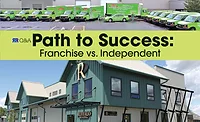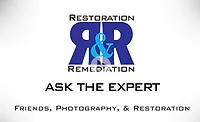To Franchise or Not to Franchise? That is the Question
We certainly don’t mean to reference ole’ Bill Shakespeare here, but what better way to introduce a common dilemma that many cleaning and restoration business owners are weighing every day: franchise or don’t franchise? It’s a difficult decision and one that should be considered very carefully for all of those involved. And what better way is there to get the inside scoop on the pros and cons of becoming a franchisee or staying independent than by asking those that have walked the walk themselves?
In the first half of this story, we spoke with Gary Glenn (ServiceMaster by A-Town Hi-Tech) and Everette Wroten (PuroClean of Glen Burnie, MD), two professionals that made the transition from independent to franchisee. Here’s a look at what each of them had to say:
ICS Cleaning Specialist: You converted from an independent operator to a franchisee: What was your thought process behind the move?
Gary Glenn: Two great reasons – strength in numbers, which includes training specific to ServiceMaster. Obviously, ServiceMaster has a team that is securing insurance contracts. (As an independent) we were not losing volume, but we were really struggling to maintain volume. I was spending nearly 50% of my advertising dollars trying to let people know that they didn’t have to use the mitigation contractor that the insurance companies were promoting. I figured I could spend more on advertising my services and pay royalties for the same monies.
Everette Wroten: Insurance companies, as a whole, had started trending away from smaller independent companies and looking more at national franchises. Also, I had the desire to be part of something bigger. I had been shooting from the hip for a long time.
ICS: What have been some of the key differences?
GG: More paperwork, mostly in documentation. Also, after being an independent for 39.5 years, it was a little different getting used to the corporate structure. (It) took a full year to get acclimated.
EW: We are now recognized. PuroClean had spent the money that I couldn’t on branding.
ICS: Talk about some of the benefits of being a franchisee.
GG: ServiceMaster has been around over 60 years and is a well-recognized name. I live in a town with an Air Force base, so we have a lot of people coming through that have possibly used ServiceMaster before and have had a positive result. (Other benefits include) the insurance contracts, the training staff for IICRC certifications (and a) great research and development team always looking for better products.
EW: I have found it easier to market my company being part of a large network. I got on a program I was not able to as an independent.
ICS: What advice would you give to someone thinking about making the change you did?
GG: It’s a tough decision, and it is not for everybody. If you are heavy into restoration and you are struggling to maintain your volume and you are up against green trucks or yellow trucks, it would be worthwhile to at least talk to corporate. It won’t work for everyone (and) if you feel you need to buck the system – don’t waste your money. But, if you can conform and let tried and proven programs build your business and you are willing to make some changes in how you do things, then it is worth a shot.
EW: My advice is only the individual can determine if making the change is right for them or not. It was for me and I’m glad I did it.
Now that we’ve heard from those who have made the switch from independent to franchisee, let’s turn things around and take a look at the other side of things. To get a feel for the benefits that independent operators hold over franchisees, we talked with O.P. Almaraz (Allied Restoration Service) and Bill Begal (Begal Enterprises).
ICS: Give us your take on the benefits to being an independent operator.
O.P. Almaraz (Allied Restoration): As an independent operator I’m not bound by territory restrictions, I don’t have to pay percentage fees on all my revenue, I have the freedom to use my marketing budget on building key relationships and investing marketing dollars to increase my profitability (and) I have the flexibility to adjust processes and procedures, with no concern of being penalized for violating an agreement.
Bill Begal: (Being) independent allows me to have a little more freedom in what we do. I don’t have access to the large advertising dollars that franchises do, but I also know that 5 or 10 or 15%... stays in the company and doesn’t have to be paid out in the form of royalty. As with anything, I believe there are absolute benefits and non-benefits.
ICS: Have you ever thought about converting from independent operator to a franchisee? What stopped you?
OPA: Yes, I’ve extensively researched six franchise firms. I met with a regional franchise manager – the biggest issue was they wanted me to pay them a percentage of my existing (construction) revenue, which at the time was a little over $2 million. When I asked them what they’d provide for this fee, it was nothing! It was only a way to regulate their franchises from running jobs outside of the franchise and fee agreements. I could have justified paying a fee if they had training programs, or value-added features that would help my construction division grow and develop.
BB: At one point (franchising) might have crossed my mind, but I grew up in a family dry cleaning business. From that mindset of being an independent operator, that’s where I was rooted. The industry has changed and there seems to be a lot more organizing of the industry. There’s a lot of franchises, there’s a lot of collective agreements. As the independent, we are often the minority in the large sea. (But) I like the ability to really control our destiny.
ICS: What advice would you give to someone that’s on the fence about whether to remain independent?
OPA: Anyone considering it must first and foremost be honest with themselves. Do you have the experience and expertise to be an independent operator? Do you have the tenacity to develop and sustain your sales and marketing objectives and hold yourself accountable to stay profitable? Do you have a proven system embedded in your company that allows you to be confident that each member of your team knows exactly what to do and when to do it? Are you aware of lurking liability exposures that can have a negative impact to your business? If your honest answer to these questions is “no,” then you should really consider a franchise. As the president of the Cleaning and Restoration Association (CRA), I’m concerned for restorers and committed to their success. This is a $72.8 billion dollar industry in the U.S. alone, but without the right guidance your business can become another casualty.
BB: I never give advice – I share experiences. For me, advice is someone telling you to do something that maybe hasn’t done it themselves. Do your due diligence. Do your homework. Speak to franchise owners, speak to independents. Find out what’s good and what’s bad, find out what they like and don’t like. What do you pay up to the home company? Look at what you’re getting involved with.
ICS: Is there anything else you’d like to share?
OPA: I’m patiently waiting for the right franchise firm to step into this industry, whose mission is to teach and help each franchisee!
BB: If something looks easy, in my experience, it’s not because it is easy. It’s because the people that are doing it are working really hard and doing a really good job. That’s with anything. I’m always looking at other ways and things to do. Everything worth doing involves hard work. It’s diligence, it’s tenacity, it’s commitment – it’s doing the right thing when nobody’s looking, it’s doing the right thing when everybody’s looking.
Looking for a reprint of this article?
From high-res PDFs to custom plaques, order your copy today!







